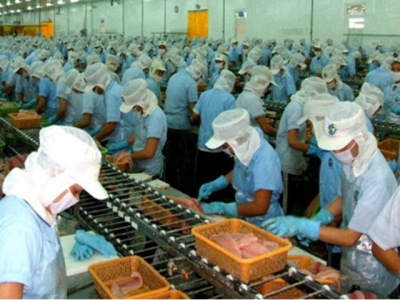Aquatic exports fall in five-month period

Aquatic exports saw slight drops in both volume and value during the first five months of 2019, according to the Ministry of Industry and Trade.
An aquatic product processing line. (Illustrative photo: VOV)
Statistics newly released by the Ministry of Industry and Trade (MoIT) show that the country reaped US$750 million from the export of 176,000 tons of aquatic products during May, a drop of 1.64 per cent in value and 0.33 per cent in volume against the corresponding period last year.
During the five-month period, aquatic exports reached a total of 748,200 tons valued at US$3.17 billion, representing respective decreases of 1.82 per cent and 1 per cent.
Tra fish exports to major markets such as the US, Japan, and Southeast Asian countries are predicted to increase in the short term, while the shipment of such products to the Chinese market is believed to meet difficulties.
Tit-for-tat tariffs triggered by the ongoing US - China trade tensions have stifled China’s aquatic exports. Hence, these products, notably tilapia are more readily available in the Chinese market. This poses a threat to Vietnam’s export of aquatic products to the neighboring country.
China has approved a list of 33 Vietnamese aquatic products that are subject to tariff exemptions when they are exported via Hekou border gate in Yunnan province which shares border with Lao Cai province in northern Vietnam. However, it has recently imposed increasingly stringent requirements regarding the quality and origin of imports.
Notably, the Asian giant has made bold investment in building and upgrading large-scale quality and quarantine testing stations in border areas. These facilities, equipped with leading-edge devices, are capable of providing testing services on the same standards seen in the US, Japan, and the EU.
Local exporters will have to seek certificates of export for their foodstuff shipments to China as of October 1, the MoIT warned, adding that they must meet new requirements with regard to quality and origin traceability, along with standards relating to packaging, labeling, and barcode.
Meanwhile, difficulties remain over shrimp exports due to fierce competition and drops in world prices.
Since the beginning of 2019, major shrimp exporters such as India, Ecuador, Indonesia, and Thailand saw increases in their output thanks to favourable weather conditions.
The global shrimp supply is expected to soar this month as the world’s key providers including Vietnam, Thailand, and China enter the harvest season, thus further dragging prices down.
Có thể bạn quan tâm
 Vietnam’s pangasius conquered many major Chinese cities
Vietnam’s pangasius conquered many major Chinese cities Through online channels such as China's leading e-commerce platform Alibaba, Vietnam’s pangasius products have been exported to many major Chinese cities.
 Shrimp thrive on microalgae feeds
Shrimp thrive on microalgae feeds Substituting microalgae for at least part of the fish oil content contained in shrimp feeds can improve the growth rates and FCRs of whiteleg shrimp.
 Hà Nội to tighten control cage culture in rivers
Hà Nội to tighten control cage culture in rivers Fish farmers have suffered heavy loss when their farmed fish in cages in Red river were found dead due to polluted environment and diseases